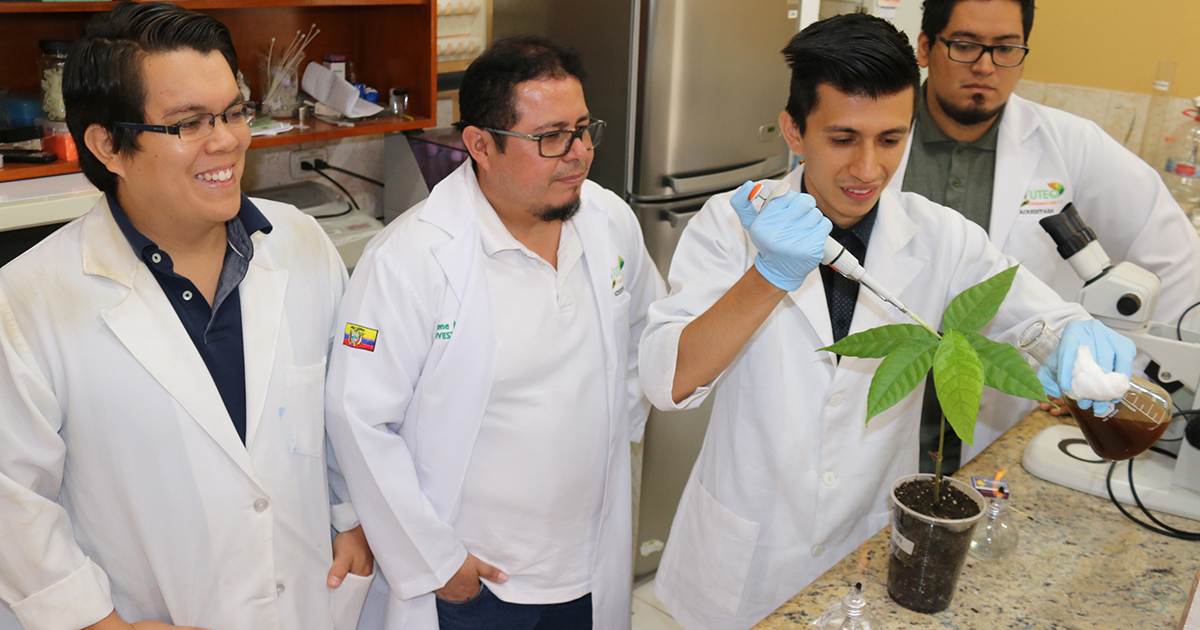UTEQ First Place in the International Biotechnology Congress
Published on 01 from November from 2018

Ángel Cedeño, a graduate of the Agronomy Engineering course at UTEQ, won First Place at the IV International Congress on Biotechnology and Biodiversity (CIBB) 2018 organised by ESPOL.
The congress was held from 22 to 25 October and took place at the Hilton Colon Hotel in the city of Guayaquil, where more than 100 speakers participated, including representatives from national universities such as the Escuela Superior Politécnica del Litoral, Universidad Técnica Estatal de Quevedo, Universidad de Guayaquil, Universidad de las Fuerzas Armadas del Ecuador, Universidad de Cuenca, Universidad San Francisco de Quito, among others; and foreign universities from countries such as: Colombia, Mexico, Belgium, Cuba, United States, Brazil, among others.
Angel Cedeño, representing the UTEQ, won the first place with the topic ""Molecular identification of Phytophthora spp, using molecular markers (ITS), and antagonistic effect of plant growth promoting rhizobacteria (PGPR)"".
The main objective of this research project was to analyse the genetic variations of Phytophthora spp (a fungal species that causes many diseases), with 26 isolates from nine cocoa-producing areas in Ecuador, where morphological and molecular characters were studied. Using specific ITS markers, it was found that the main causal agent was Phytophthora palmivora distributed in different agroclimatological conditions, which affects the form of infection of each ecotype, for which direct inoculations were used on CCN51 cocoa pods and the progress of the infection was evaluated.
This result was corroborated with the molecular analysis ERIC-PCR where the genetic variability in relation to the genotype of each isolate was highlighted. The antagonistic and growth promoting effect of certain bacteria such as Acinetobacter calcoaceticus (PM2-12), Pseudomona protegens (CHA0), Serratia marcescens (PM3-8), Pseudomona veronii (R4) was evaluated. Strain R4 reached the highest percentage of inhibition with averages above 78 %, standing out from the other treatments used, CHA0, PM3/8 and M2/12 that reached averages of 60.51- 61.85 and 71.38 % respectively.
The bacterial strain R4 considerably reduced the mortality caused by P. palmivora in cocoa seedlings and increased the root mass by 50% more than the treatment without bacterial inoculation.
The execution of the research work will allow the classification and selection of native strains of plant growth promoting rhizobacteria (PGPR) from native cultivars of Musaceae, from the Species Bank of the Microbiology Laboratory, with nematicidal and fungal potential. The continuity of the subject will additionally allow the classification of rhizobacteria that positively promote relevant aspects for the development of the architecture of the plants with which they interact.
The aim is to obtain bacteria with potential commercial applications, which will reduce the use of fungal products for soil improvement and environmental protection. The experimental evaluation will allow us to determine the antagonistic effect of our isolates on the fungus under in vitro and in vivo conditions. And in the future, we will obtain a platform focused on the biological control of nematodes and phytopathogenic fungi, considering the use of antagonistic bacteria, which will contribute to the development of sustainable agronomy in cocoa and banana cultivation. In addition to the first place, UTEQ also won second and seventh place, in the same order, Hayron Canchignia, teacher, and Javier Auhing, UTEQ graduate.
Foto: (From left to right) UTEQ representatives who participated in the CIBB-2018 Javier Auhing, Hayron Canchignia (UTEQ teacher), Ángel Cedeño (Winner) and Ricardo Romero.

